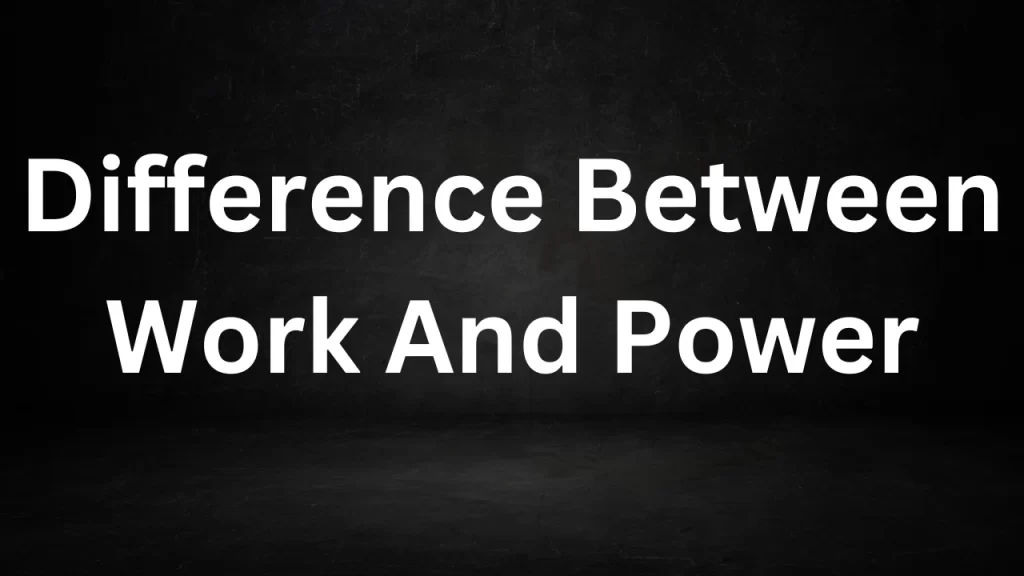Difference Between Work And Power: Works and power are fundamental concepts in physics, describing how forces and energy are related to the motion and transformation of objects.
While they are related, they represent different aspects of physical processes. Here’s a breakdown of the key differences between works and power:

Difference Between Work And Power
1. Definition:
- Work: Works is a measure of the energy transferred when a force is applied to an object, causing it to move a certain distance in the direction of the force. Mathematically, work (W) is calculated as the product of the force (F) applied to an object and the distance (d) over which the force is applied in the direction of the force’s displacement: W = F × d.
- Power: Power is the rate at which work is done or the rate at which energy is transferred or transformed. It measures how quickly works is performed. Mathematically, power (P) is calculated as the amount of work (W) done divided by the time (t) it takes to do that work: P = W / t.
2. Quantity and Unit:
- Work: Works is a scalar quantity, meaning it has magnitude but no direction. Its standard unit in the International System of Units (SI) is the joule (J), which is equal to one newton-meter (1 N·m).
- Power: Power is a scalar quantity as well, and it measures how fast works is done. Its standard unit in the SI system is the watt (W), which is equal to one joule per second (1 J/s).
3. Time Dependency:
- Work: Works is not explicitly dependent on time. It represents the total energy transfer or transformation that occurs as a result of applying a force over a certain distance.
- Power: Power explicitly involves time. It quantifies the rate at which work is done or energy is transferred, indicating how quickly a task is accomplished.
4. Example:
- Imagine lifting a heavy box vertically upward. The works done would be equal to the force applied (lifting force) multiplied by the distance the box is lifted.
- Power, in this context, would express how quickly you lifted the box. If you lifted it quickly, you exerted more power. If you lifted it slowly, you exerted less power, even though the work done remains the same.
5. Relationship:
- Works and power are related mathematically. If you know the amount of work done and the time it took to do that work, you can calculate the power using the formula: P = W / t.
6. Practical Applications:
- Work: Work is often used to describe tasks or processes that involve the transfer or transformation of energy, such as lifting objects, moving machinery, or performing physical exercises.
- Power: Power is useful in contexts where the rate of energy transfer or the speed of performing a task is important. It is applied in fields like engineering, mechanics, and electricity, especially when measuring the performance of machines or engines.
In summary, work and power are closely related concepts in physics, but they focus on different aspects of physical processes.
Work measures the total energy transfer or transformation, while power quantifies how quickly that work is accomplished. Understanding these concepts is crucial in various scientific and engineering applications.
Read More
- Difference Between Gravitation And Gravity
- Molecular Weight Of H2SO4
- Distance Time Velocity Time Graph
- Difference Between Kinetics And Kinematics
- Changing States Of Matter Class 9
Frequently Asked Question (FAQs) Difference Between Work And Power
What is the fundamental difference between work and power?
The fundamental difference between work and power is that work measures the total energy transferred or transformed when a force is applied to an object over a certain distance, while power measures how quickly that works is done or the rate at which energy is transferred or transformed.
Can you provide an example to illustrate the difference between work and power?
Sure, let’s consider lifting a heavy box. The work done would be the product of the force applied (lifting force) and the distance the box is lifted. However, power would express how quickly you lifted the box. If you lifted it rapidly, you exerted more power, but the work done remained the same. If you lifted it slowly, you exerted less power.
Is work dependent on time?
No, work is not explicitly dependent on time. It represents the total energy transfer or transformation that occurs as a result of applying a force over a certain distance. Time is not a direct factor in calculating work.
How is power related to work mathematically?
Power is related to works through a mathematical formula: Power (P) = Work (W) / Time (t). If you know the amount of works done and the time it took to do that works, you can calculate the power.
What are the units for work and power in the International System of Units (SI)?
In the SI system, the unit for work is the joule (J), which is equivalent to one newton-meter (1 N·m). The unit for power is the watt (W), which is equivalent to one joule per second (1 J/s).
